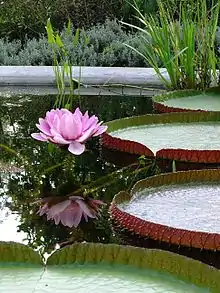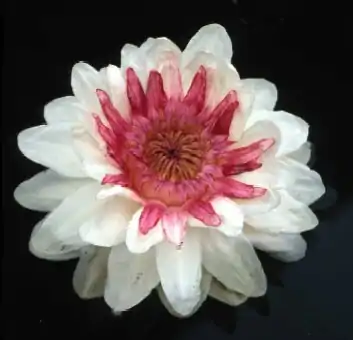Victoria (plant)
Victoria or giant waterlily[1] is a genus of water-lilies, in the plant family Nymphaeaceae, with very large green leaves that lie flat on the water's surface. Victoria boliviana has a leaf that is up to 3 metres (9.8 ft) in width, on a stalk up to 8 metres (26 ft) in length. The genus name was given in honour of Queen Victoria of the United Kingdom. It pushes other water plants aside as it spreads out until only those of its kind remains. When this happens it has nearly completely cut out the sunlight from getting to any plants below the water[2] limited only by circle packing. All three species typically have four sepals each measuring 12 centimetres (4.7 in) long by 8 centimetres (3.1 in) wide. There are typically 50 to 70 petals and 150 to 200 stamens.[3]
| Victoria | |
|---|---|
 | |
| A flowering Victoria in the Amsterdam Hortus Botanicus | |
| Scientific classification | |
| Kingdom: | Plantae |
| Clade: | Tracheophytes |
| Clade: | Angiosperms |
| Order: | Nymphaeales |
| Family: | Nymphaeaceae |
| Genus: | Victoria Lindley |
| Species | |
|
See text. | |
Extant species
| Image | Scientific name | Distribution | Description |
|---|---|---|---|
 | Victoria amazonica (Poepp.) J.C. Sowerby | shallow waters of the Amazon River basin, such as oxbow lakes and bayous | The flowers are white the first night they are open and become pink the second night. They are up to 40 cm in diameter, and are pollinated by scarab beetles. According to Parodi, both V. amazonica and V. cruziana can occasionally produce flowers up to 50 centimetres (20 in) in width. The flower is depicted in the Guyanese coat of arms.[4] |
 | Victoria cruziana A.D.Orb. | Parana-Paraguay basin | Slightly smaller than V. amazonica, with the underside of the leaves purple rather than the red of V. amazonica, and covered with a peachlike fuzz lacking in V. amazonica. V. cruziana opens its flowers at dusk. |
 | Victoria boliviana Magdalena & L.T.Sm.[5][6] | Bolivia | Leaves reaching more than 3 metres (9.8 ft) in width, larger seed and ovule size |

The first published description of the genus was by John Lindley in 1837, based on specimens returned from British Guiana by Robert Schomburgk. Lindley named the genus after the new Queen, Victoria, and the species Victoria regia. An earlier account of the species, Euryale amazonica Poeppig, in 1832 described an affinity with Euryale ferox. A collection and description was also made by the French botanist Aimé Bonpland in 1825.[7][8]
The leaf is able to support a weight of up to 32 kilograms (71 lb), suitably distributed, although the leaf surface is delicate: so much so that "a straw held 6 inches above and dropped perpendicularly upon it would readily pass through it".[9]
References
- Horton, Helena (4 July 2022). "Third species of giant waterlily discovered at Kew Gardens". The Guardian. Retrieved 4 July 2022.
- "The Tyrant of the Deep | The Green Planet | BBC Earth". YouTube. Retrieved 23 January 2022.
- <not recorded> (February 1976). "The Floral Anatomy of Victoria(Schumb)-Nymphaceae". Botanical Journal of the Linnean Society of Londob. 72 (2): 118.
- Parodi, Lorenzo R. (1959). Encyclopedia Argentina de Agricultura y Jardineria. Buenos Aires: Editorial Acme S.A.C.I. p. 351.
- Smith, Lucy T; Magdalena, Carlos; Przelomska, Natalia A. S.; Pérez-Escobar, Oscar A.; Antonelli, Alexandre K.; Melgar-Gómez, Darío G.; Beck, Stephan; Negrão, Raquel; Mian, Sahr; Leitch, Ilia J.; Dodsworth, Steven; Maurin, Olivier; Ribero-Guardia, Gaston; Salazar, César D.; Gutierrez-Sibauty, Gloria (4 July 2022). "Revised Species Delimitation in the Giant Water Lily Genus Victoria (Nymphaeaceae) Confirms a New Species and Has Implications for Its Conservation". Frontiers in Plant Science. 13: 883151. doi:10.3389/fpls.2022.883151. PMC 9289450. PMID 35860537.
- Morelle, Rebecca (4 July 2022). "Scientists discover new giant water lily species". BBC News. Retrieved 4 July 2022.
- "Nymphaeaceae Victoria Lindl". Plant Name Details. International Plant Name Index. 2005. Retrieved 2009-04-04.
- Knotts, Kit. "Victoria's History". Victoria Adventure. Knotts. Retrieved 2012-11-14.
- Ripley, George; Dana, Charles Anderson (1861). "Leaf". The New American cyclopaedia: a popular dictionary of general knowledge. Vol. 10. New York: Appleton. p. 992.